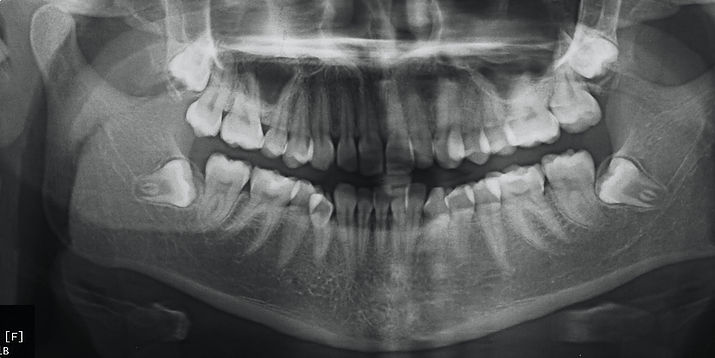The removal of impacted teeth could be a rather involved surgical procedure. Post-operative care is very important and if srtictly adhered to it will avoid unnecessary pain reduce swelling and minimise complications.
Immediately Following Surgery
- The gauze pad placed over the surgical area should be kept in place for a half hour. After this time, the gauze pad should be removed and discarded.
- Vigorous mouth rinsing or touching the wound area following surgery should be avoided. This may initiate bleeding by dislodging the blood clot that has formed.
- Take the prescribed pain medications as soon as you begin to feel discomfort. This will usually coincide with the local anesthetic wearing off.
- Restrict your activities the day of surgery and resume normal activity when you feel comfortable.
- Place ice packs to the sides of your face where surgery was performed.

Antibiotics
Be sure to take the prescribed antibiotics as directed by your oral surgeron to help prevent infection. Please be aware that oral contraceptives are influenced by antibiotics and the contraceptive pill may not be very effective. It is advisable to use extra barrier methods as a precaution.
Bleeding
Some bleeding or a blood tinge in the saliva is normal for 24 hours after surgery. Excessive bleeding (your mouth fills up with blood) can be controlled by biting on a gauze pad placed directly on the bleeding wound for 30 minutes. If bleeding continues please call for further instructions.
Diet
After general anesthetic or I.V. sedation, liquids should be initially taken. Do not use straws. Drink from a glass. The sucking motion can cause more bleeding by dislodging the blood clot. You may eat anything soft by chewing away form the surgical sites. You should prevent dehydration by taking fluids regularly. Your food intake will be limited for the first few days. You should compensate for this by increasing your fluid intake. At least 5-6 glasses of liquid should be taken daily. Try not to miss a single meal. You will feel better, have more strength, less discomfort and heal faster if you continue to eat.
Discoloration
In some cases, discoloration of the skin follows swelling. The development of black, blue, green, or yellow discoloration is due to blood spreading beneath the tissues. This is a normal post-operative occurrence, which may occur 2-3 days post-operatively. Moist warm packs may be applied to the area which may speed up the removal of the discoloration, however do not do this until day 3.
Keep The Mouth Clean
Good oral hygiene is essential to good healing. The day after surgery, start mouth rinsing with warm salt water 3 times a day, after breakfast, lunch and dinner. Salt water rinses should be – 1 teaspoon of salt in a cup of warm water. Brush your teeth as normal, however do avoid the site of surgery for the first week after surgery. After 1 week brush as normal, just be gentle at the surgical sites. Continue this procedure until your follow up appointment with your surgeon.
Nausea And Vomitting
In the event of nausea and/or vomiting following surgery, do not take anything by mouth for at least an hour including the prescribed medicine. You should then sip on lemonade. You should sip slowly over a fifteen-minute period. When the nausea subsides you can begin taking solid foods and the prescribed medicine. Strong pain kileere may contribute to that particularly in young females. Please talk to your surgeon for alternatives.
Pain
You should begin taking pain medication as soon as you feel the local anaesthetic wearing off. For moderate pain, adults can take 2 tablets of panadol every 6 hours maximum of 8 tablets in a day. Ibuprofen (neurofen, advil) comes in 200mg – 400mg over the counter, and can be taken every 8 hours with food. Not to be taken if you have a gastric or kidney problems. For severe pain, the prescribed medication should be taken as directed.
If the pain does not begin to subside in two days, or increases after two days, please call the office.
For severe pain, take the tablets prescribed by your oral surgeon as directed. The prescribed pain medic could make you sleepy. Do not drive an automobile or work around machinery. Avoid alcoholic beverages. Pain or discomfort following surgery should subside more and more every day. If pain persists, it may require attention and you should call the office.

Swelling
The swelling that is normally expected is usually proportional to the surgery involved. Swelling around the mouth, cheeks, eyes and sides of the face is not uncommon. This is the body’s normal reaction to surgery and eventual repair. The swelling will not become apparent until the day following surgery and will not reach its maximum until 2-3 days post-operatively. However, the swelling may be minimized by the immediate use of ice packs.
To minimize swelling, apply an ice pack in the area of surgery. Apply the ice pack for 15 minute intervals per hour, for the first 48 hours after surgery. After 48 hours, ice has no beneficial effect. If swelling or jaw stiffness has persisted for several days, there is no cause for alarm. This is a normal reaction to surgery. 48 hours following surgery, the application of warm packs to the sides of the face will help in reducing the size of the swelling.
Other Complications
- If numbness of the lip, chin, or tongue occurs there is no cause for alarm. This is usually temporary in nature. You just need to be careful to avoid biting n them.
- You should be careful going from the lying down position to standing. You could get light headed in this case. Before standing up, you should sit for one minute then get up.
- Occasionally, patients may feel hard projections in the mouth with their tongue. They are not roots, they are the bony walls which supported the tooth. These projections usually smooth out spontaneously. If not, please mention them to your surgeon i the follow up appointment.
- If the corners of your mouth are stretched, they may dry out and crack. Your lips should be kept moist with an ointment such as vaseline.
- Slight elevation of temperature immediately following surgery is not uncommon. If the fever persists, notify the office.
- A sore throat may develop. This relates to stretch of some of the muscles and to the general anesthetic mask/tube. This is normal and should subside in two to three days.
- Stiffness (Trimus) of the jaw muscles may cause difficulty in opening your mouth for a few days following surgery. This is a normal post-operative event which will resolve in time. Following the post operative mouth exercises prescribed in your pamphlet will minimise this occurence.
Finally
Sutures are placed the area of surgery to minimize post-operative bleeding and to help healing. Sometimes they become dislodged, this is no cause for alarm. Just remove the suture form your mouth and discard it. The sutures may be removed by your oral surgeon approximately 10 – 14 days after surgery. The removal of sutures requires no anesthesia or needles. It is quite a quick procedure. In most cases this will not be necessary as we usually use resorbable sutures.
The pain and swelling should subside more and more each day following surgery. If your post-operative pain or swelling worsens or unusual symptoms occur particularly after initial improvement call the office for instructions.
There will be a cavity where the tooth was removed. The cavity will gradually over the next month fill in with the new tissue. In the mean time, the area should be kept clean especially after meals with warm salt water rinses and toothbrush.
Your case is individual, no two mouths are alike. Do not accept well intended advice from friends. Discuss your problem with the persons best able to effectively help you: your oral surgeon’s office or your family dentist.
Brushing your teeth is okay – just be gentle at the surgical sites.
A dry socket is when the blood clot gets dislodged prematurely from the tooth socket. Symptoms of pain at the surgical site and even pain to the ear may occur 2-3 days following surgery. Call the office if this occurs.
